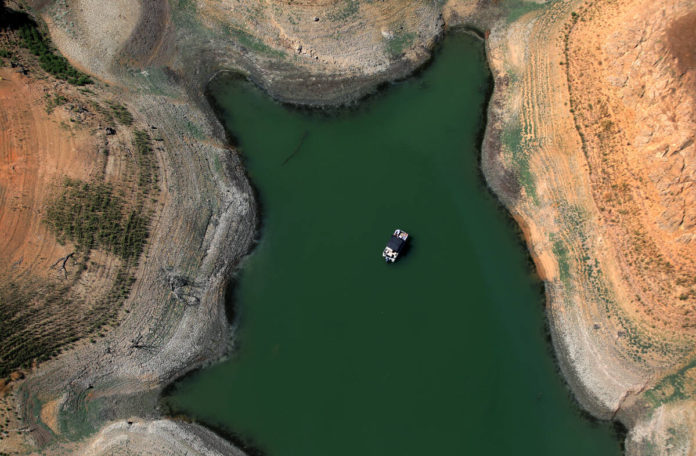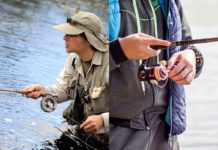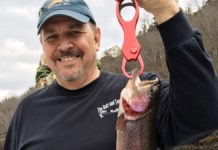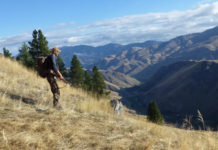On her walks, “there are fewer birds,” Thomas said. “I imagine the fish in duress. Trees and bushes are dying.”
Michael Ellis, a Santa Rosa naturalist who leads tours around the globe, said the health benefits of time spent in nature have been shown through studies documenting decreased anxiety and a sense of peace in subjects exposed to the sound of rushing water and exposure to leafy trees. He noted also the crush of visitation in public parks during last year’s COVID-related shelter-in-place restrictions, as people sought escape from lives of isolation out of doors.
“Nature is essential to our well-being, so it’s mandatory for people to have somewhere to go,” said Ellis, 69.
Forestville grape grower Tim Reuling, an avid angler, knows something about that. He’s “sort of a double-A guy” who works hard on the ranch and looks forward to opportunities to recharge along the banks of a mountain stream or lake.
Low rainfall and snowmelt over the past two years means river and creeks are running at lower levels than usual and are subject to higher temperatures in the afternoon sun, which puts the fish that live there under significant stress.
Experts and fishing groups like Trout Unlimited have urged anglers to fish only during the cool morning hours — a requirement this summer in many Oregon waterways — because catch-and-release fishing, combined with the heat, puts more pressure on some fish than they can handle.
For the environmentally conscious, the whole discussion “kind of begs the question” of whether it’s worth going fishing at all this year, Reuling, 72, said.
Add to that, the widespread smoke, and “maybe you just don’t do it this year, or you go on the ocean and you fish, or you surf fish, or something like that.”
“A large part of the enjoyment I derive is just the tranquility and just looking around and appreciating the natural visual beauty that’s there — not to wax too romantically — but just seeing the water and listening to the stream and things like that,” said Reuling, who is rethinking a planned fishing trip in an area of Lassen National Park that’s right outside the Dixie fire zone. “Everybody has their own experience, but for me, as my wife characterizes it, it’s sort of a Zen moment for me.”
Painful memories
For many in Sonoma County, the link between dry weather and wildfires is painfully evident both in their memories and outside their kitchen windows. More than one-fifth of the county has burned since the Tubbs and Nuns fires of 2017, and thousands of homes have been destroyed in deadly fires.
Add smoke from monster blazes around the state to the mix, and the emotional impact is more daunting yet.
“It’s anxiety,” said Nancy Skinner, 67, of Santa Rosa. “And you wake up every day to anxiety. It’s like you don’t want to watch the TV. You don’t want to watch the news. You’re just waiting for our thing to start up.”
That concern about where fire may start next is a key reason U.S. Forest Service officials decided recently to first close all national forests in Northern California, and then the entire state. With the exceptionally dry conditions, firefighting resources are already stretched with wildfires already raging out of control.
Officials hope reducing the number of individuals among the trees will lesson the likelihood of a fire igniting, as well as the potential for people becoming trapped — or worse — if one does.
The closures will last at least Sept. 17.
It’s the second year in a row the federal agency has closed California’s national forest to the pubic to counter the threat of wildfire. The state Department of Fish and Wildlife also has closed 34 wildlife areas and preserves adjacent to Northern California forests because of the fire threat.
For avid camper Bob Murnane, whose family heads off to the woods most holiday weekends, life is starting to be increasingly dictated by the vagaries of fire.
“It’s like the whole second half of summer, there’s smoke covering different halves of the state,” the west Santa Rosa man said. “Last year we were in Yosemite on Labor Day weekend, and it was just raining ash on us one whole day.”
He and his extended family are among those staying put this weekend. After three attempts at a mini-family reunion over the past year were canceled due to the COVID pandemic and finally, wildfire, they are opting for a “scaled back plan” and some “scaled back fun” this weekend at home, where he lives with his wife, Suzán, and their three offspring. His dad, 80, and mom, 76, live in a house on the same property. His sister and her husband will be joining them.
Credit: Source link































